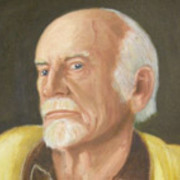
Ron Bowie
Born in Napier in 1907, Ronald Trent Bowie would go on to work at the National Film Unit from 1954 until 1972.
From a young age, Bowie was interested in theatre, and acted and worked behind the scenes in many amateur productions. In 1936, he had a small role in Kiwi film pioneer Rudall Hayward's first talkie, On The Friendly Road.
Bowie's hopes of progressing further in film were seriously deflected after the onset of World War II. His pacifist convictions resulted in five and a half years internment as a conscientious objector. Fellow inmate Jack Willets later said of him, "he was not complicated by religion. He was there simply because he did not want to go to other countries to kill people". Bowie painted and sketched while interned. He also produced a number of plays with other detainees.
Following the war, conscientious objectors were barred from taking public service jobs. Bowie went to work at a Kodak retail store in Auckland. From there, he became a production assistant at Neuline Film Studios, run by Australian arrival Robert Steele.
A short film he made about housing standards got him noticed by National Film Unit manager Geoffrey Scott, who was impressed enough to hire him. Bowie was older than most of his colleagues at the Unit, but his maturity proved an asset. He worked variously as a unit assistant before becoming a director, then produced many NFU films.
Over many years, Bowie contributed to some notable and award-winning NFU productions, documenting New Zealand and its people: from directing Godfrey Bowen doco Shearing Technique to helping produce three screen epic This is New Zealand, which won big audiences at Expo 70 in Japan before being seen by roughly 400,000 Kiwis back home.
Amongst the films was One Hundred and Forty Days Under The World, a half-hour documentary about NZ scientists at Scott Base in Antarctica. Directed by Kell Fowler and edited and narrated by Bowie, the film was nominated for an Academy Award in 1964.
The same year he directed Amazing New Zealand!, which won five international awards, including a Bronze Medal of St Mark at the Venice Film Festival. Bowie's ingenuity saw him lash three 16mm cameras together to produce some of the images.
Bowie reluctantly retired from the Film Unit at the mandatory age of 65 in 1972, but not before he'd mentored and supported some rising stars, including Paul Maunder. Maunder, who made the controversial Gone Up North for A While with Bowie as producer, later praised him for his support and creative eye.
Bowie's retirement was not idle. He continued his involvement with Wellington repertory theatre, and Friday night soirees at his Oriental Parade apartment were legendary.
Ron Bowie passed away in Auckland on 27 October 2000.